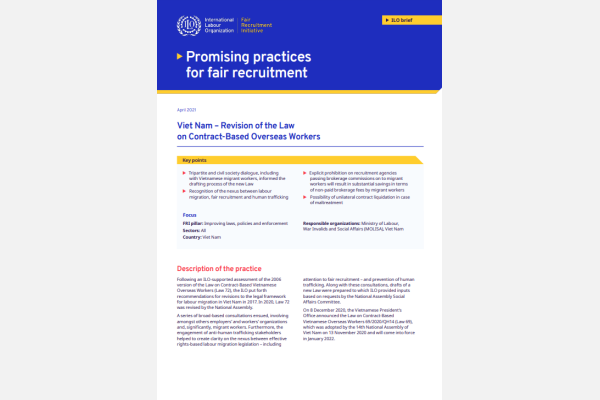Repository of Practices

Viet Nam – Revision of the Law on Vietnamese Contract-Based Overseas Workers
Secondary GCM Objectives
Dates
Type of practice
Summary
Following an ILO-supported assessment of the 2006 version of the Law on Contract-Based Vietnamese Overseas Workers (Law 72), the ILO put forth recommendations for revisions to the legal framework for labour migration in Viet Nam in 2017. In 2020, Law 72 was revised by the National Assembly. A series of broad-based consultations ensued, involving amongst others employers’ and workers’ organizations and, significantly, migrant workers. Furthermore, the engagement of anti-human trafficking stakeholders helped to create clarity on the nexus between effective rights-based labour migration legislation – including attention to fair recruitment – and prevention of human trafficking. Along with these consultations, drafts of a new Law were prepared to which ILO provided inputs based on requests by the National Assembly Social Affairs Committee.
On 8 December 2020, the Vietnamese President’s Office announced the Law on Contract-Based Vietnamese Overseas Workers 69/2020/QH14 (Law 69), which was adopted by the 14th National Assembly of Viet Nam on 13 November 2020 and will come into force in January 2022. Several of the ILO’s key recommendations have been incorporated into the final version of the Law, including:
• The removal of the obligation for migrant workers to pay brokerage commissions and an explicit prohibition on recruitment agencies passing these costs on to workers;
• The removal of the obligation for migrant workers to pay service fees in addition to brokerage commission to public employment services in line with Convention No. 88;
• If part or all of the service fee is covered by employers or overseas-worker receiving parties, then workers will only pay for any remaining amount required under Law;
• The ability for migrant workers to unilaterally liquidate contracts in situations of threats, sexual harassment, maltreatment or forced labour;
• The inclusion of definitions for discrimination and forced labour in line with ILO Conventions No. 111 and Protocol P029;
• A provision for legal aid in cases of abuse, violence or discrimination whilst working abroad;
• Specific wording about gender equality in the state goals;
• Prohibition on deceitful advertising for the purpose of organizing trafficking in persons, abusing recruitment activities to illegally collect fees, and charging brokerage fees – breaching these prohibitions results in recruitment agency license revocation;
• Pre-departure training must include information on: forced labour, trafficking in persons prevention, gender equality, sexual abuse, gender-based violence and prevention skills.
Organizations
Main Implementing Organization(s)
Detailed Information
Partner/Donor Organizations
Benefit and Impact
The magnitude of the number of migrant workers in previous years may provide an indication of future benefits: In 2019, over 152,530 (54,700 women) migrant workers went to work abroad through regular migration channels, including 82,703 workers to Japan and 54,480 workers to Taiwan (China). In March 2020, around 560,000 Vietnamese people were working in more than 40 countries and territories worldwide.
In 2019, migrant workers travelling to Taiwan (China) alone cumulatively paid over USD 81 million to recruitment agencies for brokerage commission (USD 1,500 per migrant worker under Law 72), which will be saved under the new Law.
Key Lessons
The revision of Law 72 presents a key opportunity to align legislation with relevant international labour migration standards and ensure ethical and responsible recruitment.
The ILO provided technical presentations, technical inputs and issues papers grounded on international labour standards, fair recruitment best practices and evidence from research and studies which support changes that decrease the likelihood of migrant workers vulnerability to abuse, exploitation, debt bondage, falling into irregular status, forced labour and human trafficking. ILO particularly focused on addressing the root causes of debt bondage and vulnerability to human trafficking; worker-paid recruitment fees and predatory recruitment practices for workers migrating abroad. The ILO through its tripartite structure and calling on multilateral and civil society partners, provide ongoing technical advice and support to tripartite actors and strengthen social dialogue at provincial, regional and national levels during the drafting and revision process.
Recommendations(if the practice is to be replicated)
- Migrant workers’ voice on risks during migration process as well as impact of high cost charge through engaging them in consultations with Drafting teams and National Assembly Deputies should be promoted.
- Ensuring best practices of zero fees/employer paid to migrant workers by recruitment agencies and employers where both migrant workers and business benefit (more productive migrant workers, low turnover rates and higher income for migrant workers) are shared;
- The strong commitment from an increasing number of multinational companies, suppliers and recruitment agencies to responsible recruitment should be demonstrated.
Innovation
The Vietnamese Government’s commitment to protection of migrant workers and prevention of forced labour in labour migration is evident in the passing of this revised Law. Improved regulatory labour migration framework through reform of Law 72 legislation decreases migrant workers’ vulnerability to human trafficking, including forced labour and debt bondage. The Law takes the critical first step towards reducing recruitment fees and related costs charged to migrant worker.
Additional Resources
Date submitted:
Disclaimer: The content of this practice reflects the views of the implementers and does not necessarily reflect the views of the United Nations, the United Nations Network on Migration, and its members.
More Related Practices:
Peer Reviewer Feedback:
*References to Kosovo shall be understood to be in the context of United Nations Security Council resolution 1244 (1999).
Newsletter
Subscribe to our newsletter.